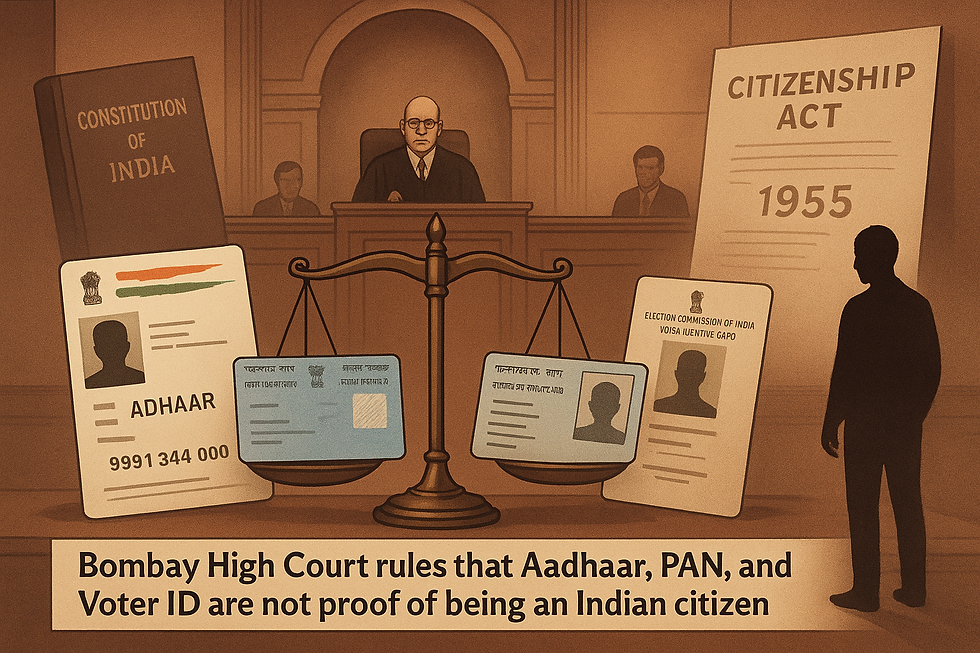Aadhar Card, PAN Card, Voter ID Card Not Proof Of Indian Citizen: Bombay High Court Insight
- Lawttorney.ai

- Sep 10, 2025
- 4 min read
Case Name: Babu Abdul Ruf Sardar V/s. The State of Maharashtra.
Introduction
There are many common misconceptions among individuals that the Aadhaar Card is considered as valid proof of Indian citizenship. Though this is not the case.
The Aadhaar Card is issued by the Unique Identification Authority of India (UIDAI) as a means of identity verification and resident authentication. It is to establish a person's identity, age, and address, but it does not validate citizenship.
In the case of Kiran Gupta v. State Election Commission & Ors, 2020 Patna High Court highlighted that the Aadhar ID and Voter ID will not be considered as a valid proof Of Citizenship. The same held in the significant case where Bombay Court rejected the bail of Bangladeshi man entered illegally in India and held that the Aadhar ID card and Voter IDs are not considered as valid proof of Citizenship.

Background of the Case
Petitioner is a Bangladeshi and residing illegally in India from 2013 and booked by the Thane police in charge of Sections 335 (causing grievous hurt) (Now 122 (2) of Bharatiya Nyaya Sanhita, 2023), 336(3) (endangering life or personal safety of others, aggravated form) (Now 125 of Bharatiya Nyaya Sanhita, 2023), and 340 (wrongful confinement) (Now 127 (1) of Bharatiya Nyaya Sanhita, 2023) read with Section 3(5) (aggravated offence relating to the above) of the Bharatiya Nyaya Sanhita, 2023, Sections 3(a) (prohibition on entry without valid passport) and 6(a) (penalty for entry without passport) of the Passport (Entry into India) Act, 1950, and Sections 3(1) (restriction on entry of foreigners), 3(2) (conditions for lawful stay), and 14 (penalty for contravention) of the Foreigners Order, 1948.
Hence, Petitioner appeals in the High Court for bail.
High Court Observation: Whether Aadhar Card is Considered as a Citizenship
Single Bench in a significant order held that the petitioner misled the Indian Authority by obtaining the Aadhar Card, PAN Card, and also a Voter ID Card, income tax records, gas and electricity connections, fraudulently.
He said, "Persons falling into the category of illegal migrants are barred from obtaining citizenship through most of the legal routes mentioned in the Act. This distinction is important, because it protects the sovereignty of the country and ensures that benefits and rights meant for citizens are not wrongfully taken by those who have no legal status to stay in India,"
Further, the court observed that whenever the case came of questioning the Citizenship of foreign Origin. The court cannot decide the matters solely on Aadhar Card, PAN Card, and also a Voter ID Card but the Foreign Individual has to comply with the section 3 to 6 of the Citizenship Act, 1955.
The Court noted that "The real source of these documents (birth certificates), whether they are genuine or fake, and whether they actually relate to the applicant, can only be found out after proper verification by the concerned authorities. In cases involving false identity and claims of citizenship, the process of verification is often detailed and takes time, as it may require the involvement of agencies like UIDAI, passport authorities, and sometimes even foreign government departments. This case also needs such careful verification, which is still going on.
"But the fact that such documents have been found on the applicant's own phone is important and cannot be ignored. If they turn out to be genuine, they could directly affect the question of whether the applicant is an Indian citizen or a foreign national staying in India without permission. At this stage, the Court cannot ignore the fact that official confirmation regarding the genuineness of the Aadhaar card and other documents is still awaited from UIDAI and other authorities."
While addressing the issue, the court denied the bail application by stating that just having the Aadhar Card, PAN Card, and also a Voter ID Card cannot make him an Indian Citizen.
Justice Borkar noted that Parliament made a law in 1955 which gave a systematic way of acquiring citizenship in India.
"In my opinion, the Citizenship Act of 1955 is the main and controlling law for deciding questions about nationality in India today. This is the statute that lays down who can be a citizen, how citizenship can be acquired and in what situations it can be lost."
Conclusion
The Single Bench, while refusing the bail of Bangladeshi citizens who reside in India and acquire forged documents. And held that merely possessing the Aadhar ID, Voter ID does not confer Citizenship of India. These documents are only for the purpose of Identification.
The Court also emphasized that citizenship can only be acquired through the Citizenship Act, which made rules and differentiates between the illegal migrants and lawful Citizens.
This Court judgement safeguards sovereignty and ensures that constitutional rights and benefits are granted only to lawful citizens.
Empower Your Legal Practice with AI – Join Our Free Webinar!
Are you a legal professional looking to boost your efficiency and stay ahead in a competitive field? Discover the power of Lawttorney.AI – the cutting-edge tool designed to streamline legal research, automate tasks, and enhance productivity.
👉 Don't miss out! Reserve your spot in our FREE webinar and experience the future of legal practice today. Register Now



Comments